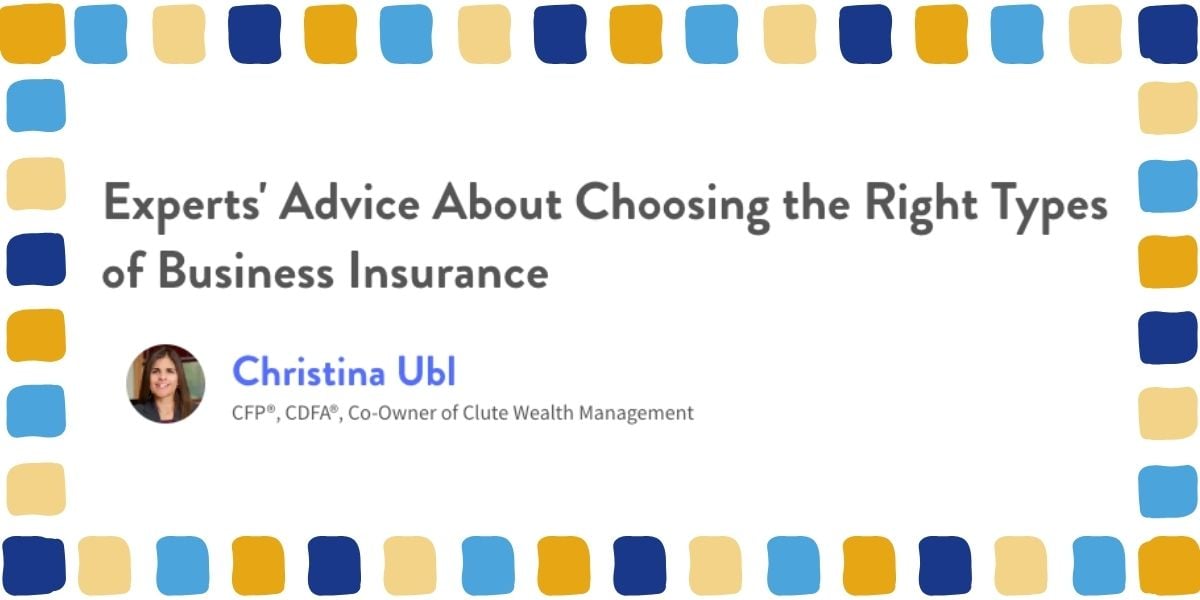
Christina continues to be called on to provide her insight on her topics of expertise. She offers advice to small business owners on the types of insurance they may want to consider, and the key factors to consider when shopping for insurance, along with some of the most common mistakes and how to avoid them.
Read Christina's full excerpt below! You can also read the whole article on the MoneyGeek website.
What are some types of business insurance that are often overlooked but are important for small businesses to have?
Business owners know they need coverage for employer-required insurance like workers’ compensation and unemployment, common risks general liability insurance and product liability or commercial property insurance when relevant. But the most often overlooked insurances, identified in a risk gap analysis, are for the unanticipated risks in the "life happens" category. For example:
- Keyperson life insurance for joint business owners: If something happened to one of the owners, would your business have enough money to replace lost revenue or cover disability or owner death benefits for heirs?
- Business overhead expense insurance for the owner: In the event you were to be disabled, BOE insurance can help keep your business afloat by covering federally deductible monthly business expenses such as employee salaries (except your own), utilities, phone bills, and lease payments.
- Personal disability insurance for the owner of the business: If you are the owner of a small business and are suddenly unable to work, you will still need money coming in to make your mortgage payments and feed your family.
- Hybrid long-term care insurance or separate life insurance and long-term care insurance: Hybrid coverage gives you access to parts of your life insurance benefits to pay for professional help if you can no longer care for yourself.
How can businesses determine the appropriate level of coverage for each type of insurance they need?
Good financial records and periodic business valuations are the keys to determining the appropriate level of coverage you need for your business and for your personal living expenses. What is the current value of the business and each owner’s share? How much are your monthly business overhead expenses? Having an adequate cash cushion for your business and personal needs may reduce the level of insurance you need to buy.
What are the key factors that businesses should consider when choosing an insurance provider?
Here are the factors to consider:
Availability: Because insurance is regulated at the state level, the first factor to consider when choosing your provider is whether it is licensed in the state or each state where your business operates or owns the property.
Industry-specific coverage: Looking beyond general liability insurance, are there specific business insurance needs and risks for your industry? Does the provider provide one or more of the specialized policies you need? Buying multiple policies from the same provider often qualifies you for a discount.
Provider reputation and stability: You want to compare the insurance companies you are considering based on their reputation for customer service and claims processing for businesses like yours and their rating for financial stability.
What are some common mistakes that businesses make when choosing insurance coverage, and how can these be avoided?
Common mistakes businesses make when choosing insurance coverage are either going with the lowest-priced insurance provider without checking them out or, worse, not periodically re-assessing their risks and requesting multiple quotes from different providers. Recent nationwide disasters have made it clear that assuming "X never happens here" is not a sound business decision.
This article is intended to assist in educating you about insurance generally and not to provide personal service. They may not take into account your personal characteristics such as budget, assets, risk tolerance, family situation or activities which may affect the type of insurance that would be right for you. In addition, state insurance laws and insurance underwriting rules may affect available coverage and its costs. Guarantees are based on the claims paying ability of the issuing company. If you need more information or would like personal advice you should consult an insurance professional. You may also visit your state’s insurance department for more information.
